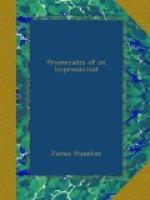Again music, not the music nor the symbolism of the emotions, but the abstract music of design. Botticelli’s appeal is also an auditive one. Other painters have spun more intricate, more beautiful scrolls of line; other painters sounded more sensuous colour music, but the subtle sarabands of Botticelli they have not composed. There is here a pleasing problem for the psychiatrist. Manifestations in paint of this species may be set down to some mental lesion; that is how Maurice Spronck classifies the sensation in writing about the verbal sensitivity of the Goncourts and Flaubert. The latter, you may remember, said that Salammbo was purple to him, and L’Education Sentimentale gray. Carthage and Paris—a characteristic fancy! But why is it that these scientific gentlemen who account for genius by eye-strain do not reprove the poets for their sensibility to the sound of words, the shape and cadences of the phrase? It appears that only prose-men are the culpable ones when they hear the harping of invisible harps from Ibsen steeplejacks, or recognise the colour of Zarathustra’s thoughts. In reality not one but thousands sit listening in the chill galleries of Florence because of the sweet, sick, nervous music of Botticelli; this testimony of the years is for the dissenters to explain.
Fantastico, Stravaganie, as Vasari nicknamed Botticelli, has literally created an audience that has learned to see as he did, fantastically and extravagantly. He passed through the three stages dear to arbitrary criticism. Serene in his youthful years; troubled, voluptuous, visionary during the Medicean period; sombre, mystic, a convert to Savonarola at the end. He passed through, not untouched, a great crisis. Certain political assassinations and the Pazzi conspiracy hurt him to the quick. He noted the turbulence of Rome and Florence, saw behind the gay-tinted arras of the Renaissance the sinister figures of its supermen and criminals. He never married. When Tommaso Soderini begged him to take a wife, he responded: “The other night I dreamed I was married. I awoke in such horror and chagrin that I could not fall asleep again. I arose and wandered about Florence like one possessed.” Evidently not intended by nature as a husband or father. Like Watteau, like Nietzsche, grand visionaries abiding on the other side of the dear common joys of life, these men were not tempted by the usual baits of happiness. The great Calumnia in the Uffizi might be construed as an image of Botticelli’s soul. Truth, naked and scorned—again we note the matchless silhouette of his Venus—misunderstood and calumniated, stands in the hall of a great palace. She points to the heavens; she is an interrogation mark, Pilate’s question. Botticelli was adored. But understood? An enigmatic malady ravaged his being. He died poor and alone, did this composer of luminous chants and pagan poems, this moulder of exotic dreams and of angels who long for other gods than those of Good and Evil. A




